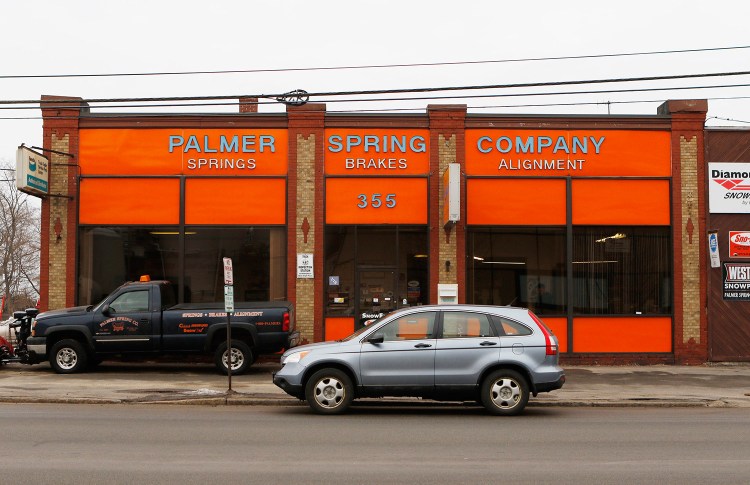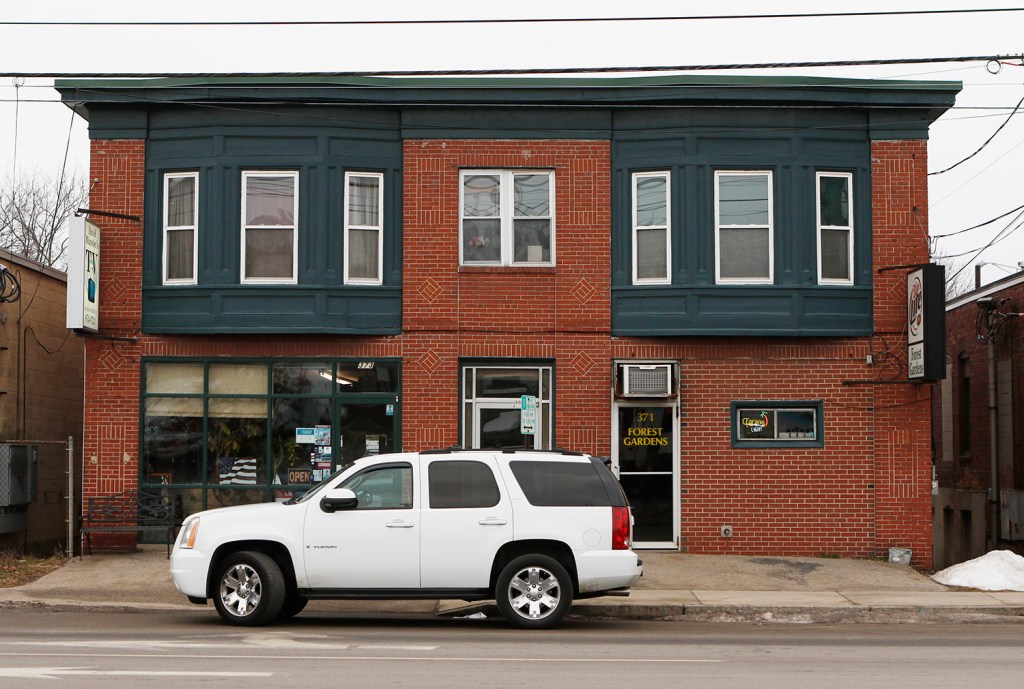Public backlash against the proposed demolition of five buildings on Forest Avenue is prompting the City Council to consider a zoning change that would prohibit a suburban-style store fronted by a large parking lot from being built on the site.
The council will have a preliminary discussion on Monday about a proposal by City Councilor Belinda Ray to rezone the triangular piece of land bordered by Preble Street Extension, Baxter Boulevard and Forest Avenue from a light-density residential and business zone to a more dense business zone. That designation would allow only buildings, not parking lots, to be built along Forest Avenue. The zoning also would heavily regulate, if not prohibit, drive-through windows.
“I think everyone is interested in discussing it,” Ray said.
No votes are scheduled for Monday’s meeting, when Mayor Ethan Strimling also will deliver his first State of the City address.
CVS sought a permit to demolish five buildings, including the Forest Gardens bar and the Palmer Spring Co., to make way for a new pharmacy. That permit application prompted the city’s Historic Preservation Board to consider adding protections to three of the five buildings. The board will hold a public hearing on that proposal Wednesday.
Sandra Guay, the attorney representing CVS before the Historic Preservation Board, didn’t respond to requests for comment. But in a memo to the preservation board dated Wednesday, she provided a report from a structural engineer and said the buildings have deteriorated beyond the point of restoration. “As noted in the reports, the present condition of the structures make bringing them up to modern code, or even to reasonable reuse, economically infeasible,” she said.
Since the proposal was first reported, there has been a public outcry, with people planning to rally to save Forest Gardens, a fixture in the neighborhood, and other groups and residents pressuring the council to take action. The preservation board has received more than a dozen letters, asking it to save Forest Gardens.
The rezoning would not prohibit a pharmacy – it would simply change the way it would look and encourage other uses, such as housing, to be included.
Ethan Boxer-Macomber, a local developer and a member of several online forums used by neighborhood groups, nonprofit organizations and the development community, said he has never seen such a unanimous response against a single proposal.
“I just saw all of my networks to light up at once over this proposal,” Boxer-Macomber said. “From time to time, things come up that are planning-related concerns, and some groups would grab onto it, but I have never seen such a strong and universal reaction against something.”
Other groups are taking an interest in the proposal, as well. GrowSmart Maine, a nonprofit that focuses on development issues, is considering taking a formal position on the rezoning proposal. And Portland Buy Local, which opposes national chain stores in favor of small independent businesses, already has sent a letter to the council supporting historic preservation efforts and opposing a new CVS store.
“The Portland Buy Local board hopes that the community outcry over the CVS project brings to light some of the policy changes needed in the city to protect our local character and quality of life,” the group wrote in a Jan. 16 letter to councilors.
The Forest Avenue corridor, especially the one-mile stretch from Interstate 295 to Woodfords Corner, has been the subject of study over the last five or so years. The city’s Transforming Forest Avenue study, completed in 2012, laid out a vision that moves away from strip malls and toward a pedestrian-friendly, mixed-use neighborhood that is adjacent to downtown.
The city already has amended zoning along the heavily traveled transportation corridor to encourage higher-density, mixed-use developments, rather than suburban-style stores with large parking lots. Some bike and pedestrian upgrades have been made and changes to Woodfords Corner are in the final planning stages.
Ray said she offered the rezoning proposal after getting more than a dozen emails and phone calls from people questioning whether the existing zoning conformed to the new Transforming Forest Avenue study, which has been adopted by the council as part of the city’s Comprehensive Plan.
“The Transforming Forest Avenue study created a vision for the Forest Avenue corridor,” Ray said. “Unfortunately when zoning was changed to address this vision, this small parcel was left out.”
In an interview, Ray seemed to choose her words carefully in describing her proposal, likely because the city and developers have been targeted by appeals and lawsuits from citizens unhappy with project approvals and rezoning requests.
The so-called “midtown project” in West Bayside was scaled back in the fall of 2014 in response to a lawsuit, and the city is currently being sued by a group of residents over a rezoning on Stevens Avenue to allow for a dense development for seniors. An unsuccessful citywide referendum was launched last year in response to a rezoning on the Eastern Waterfront, and the city had to go all the way to the Maine Supreme Judicial Court in 2014 to protect a rezoning in the West End.
City planners weren’t available Friday afternoon to discuss why these properties were not rezoned previously.
Ray’s proposal would take properties that are now zoned as R-5 residential and B-2 community business and make them all B-2b community business zones, like the rest of the land between Interstate 295 and Woodfords Corner.
“I’m requesting this zoning change to create continuity along the Forest Avenue corridor and to ensure that our zoning reflects our vision for the area,” Ray said.
Growing interest in redeveloping the Forest Avenue area prompted Greater Portland Landmarks, a preservation group that formed in 1964 after the demolition of Union Station, to commission a historical study of the area. The group said two of three of the buildings eyed for demolition were historically significant, because they were among the first in the area to house businesses that sold and serviced automobiles.
Palmer Spring replaced L.C. Glidden Auto Co. at 351-355 Forest Ave. in 1932, and continues to operate as a service garage and blacksmith. The company began making springs for horse-drawn carriages in 1849.
Although the landmarks study didn’t detail the historical significance of 371-373 Forest Ave., the city staff recommended adding historic protections. Forest Gardens has been a staple of the neighborhood at 371 Forest Ave. for about 80 years.
Send questions/comments to the editors.





Success. Please wait for the page to reload. If the page does not reload within 5 seconds, please refresh the page.
Enter your email and password to access comments.
Hi, to comment on stories you must . This profile is in addition to your subscription and website login.
Already have a commenting profile? .
Invalid username/password.
Please check your email to confirm and complete your registration.
Only subscribers are eligible to post comments. Please subscribe or login first for digital access. Here’s why.
Use the form below to reset your password. When you've submitted your account email, we will send an email with a reset code.